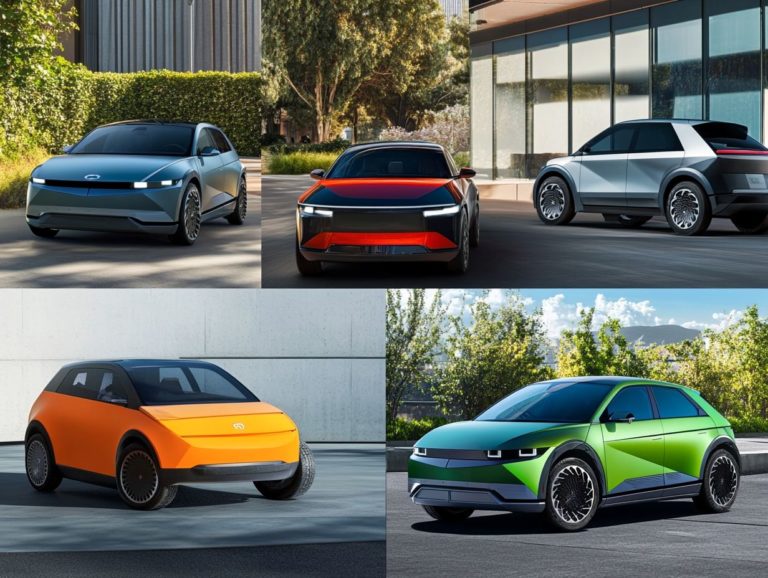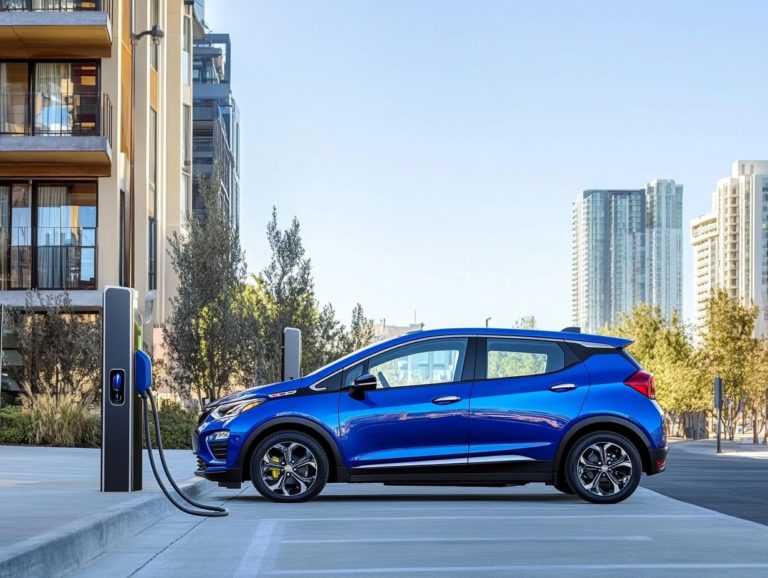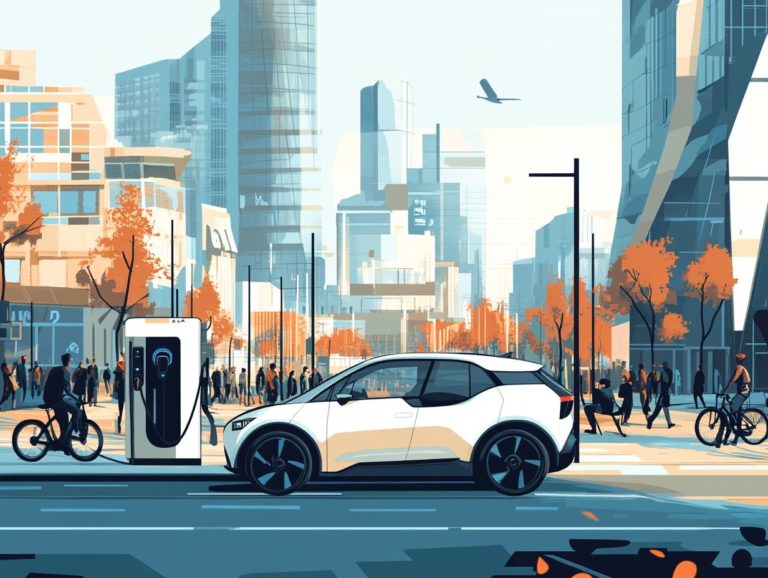Comparative Analysis: EVs for First-Time Buyers
Electric vehicles (EVs) are changing the automotive landscape. They offer many benefits for both environmentally conscious consumers and budget-savvy buyers.
This article delves into the essentials of EVs, shedding light on their inner workings and the substantial advantages they offer, including a reduced environmental impact and notable cost savings.
For those venturing into the realm of electric vehicles for the first time, you’ll discover crucial considerations such as range, battery life, and charging options. We will also compare popular models to help you make an informed decision.
Continue reading for valuable tips and insights that will guide you through the exciting world of electric vehicles!
Contents
- Key Takeaways:
- Overview of Electric Vehicles (EVs)
- Benefits of Choosing an EV
- Factors to Consider for First-Time Buyers
- Comparison of Popular EV Models
- Tips for Making an Informed Decision
- Frequently Asked Questions
- Curious about how to choose your first EV? Let’s break down the analysis!
- What are the main factors to consider when conducting a comparative analysis of EVs for first-time buyers?
- How do EVs compare to traditional gasoline cars in terms of cost for first-time buyers?
- What are the benefits of choosing an EV over a traditional gasoline car for first-time buyers?
- What are the top recommended EVs for first-time buyers based on the comparative analysis?
- How can first-time buyers determine which EV is the best fit for their needs?
- Summary
Key Takeaways:
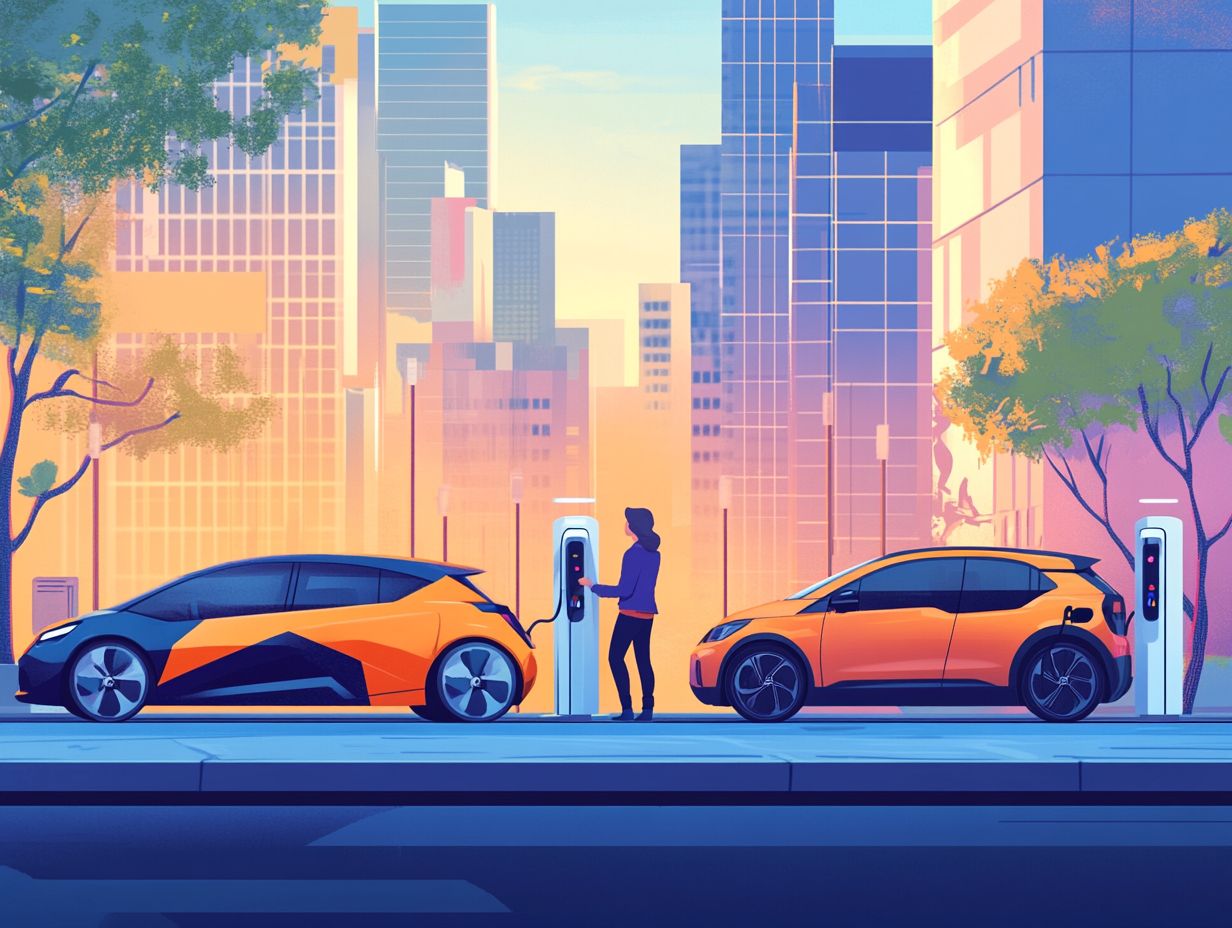
- EVs are eco-friendly, using electricity instead of fossil fuels, which reduces carbon emissions and air pollution.
- First-time buyers can save on long-term costs with EVs through lower fuel and maintenance expenses, government incentives, and tax credits.
- When considering an EV, research and test drive different models. Understand charging options, range, and costs to make informed decisions.
Overview of Electric Vehicles (EVs)
Electric vehicles (EVs) signify a remarkable transformation in the automotive landscape. They highlight cutting-edge battery technology and remarkable energy efficiency.
These vehicles are engineered to run on electricity rather than conventional fossil fuels like gasoline. This leads to decreased fuel expenses and a diminished environmental footprint.
As consumer preferences shift, demand for EVs grows stronger, marking a crucial evolution in consumer behavior and the broader automotive industry.
What are EVs and How Do They Work?
Electric vehicles (EVs) leverage advanced battery technology to store and convert electricity into power for driving. This fundamentally transforms energy consumption in the automotive industry.
These vehicles are powered by advanced lithium-ion battery systems that have seen significant improvements over the years. They offer enhanced energy density and longer lifespans compared to older models.
As you navigate the landscape of EVs, it’s essential to recognize that a robust network of charging stations is vital for widespread adoption.
Each time you plug in an EV, the vehicle s onboard computer expertly manages the charging process. This ensures optimal energy flow while minimizing battery wear.
In contrast to traditional internal combustion engine vehicles that primarily convert gasoline into mechanical power, EVs convert stored electrical energy into motion with remarkable efficiency. This results in less energy waste and reduced emissions.
Understanding these operational differences will be key to maximizing the potential and performance of electric vehicles, ultimately propelling the shift toward sustainable transportation solutions.
Benefits of Choosing an EV
Opting for an electric vehicle (EV) presents you with a wealth of advantages. These range from considerable cost savings and lower maintenance expenses to notable benefits for the environment.
It s no wonder that EVs are becoming a favored choice among discerning consumers.
Environmental Impact
Electric vehicles offer a markedly lower environmental impact compared to traditional gasoline vehicles. This is mainly due to their reduced emissions and reliance on cleaner energy sources.
This advantage arises from the fact that EVs produce zero tailpipe emissions, significantly diminishing their overall carbon footprint.
Research shows that when charged with renewable sources like wind or solar, EVs can have up to 70% lower greenhouse gas emissions than traditional cars, according to the Union of Concerned Scientists.
While gasoline vehicles emit an average of 404 grams of CO2 per mile, EVs can operate with emissions as low as 20 grams per mile when harnessing clean energy.
As municipalities and utilities increasingly adopt sustainable energy infrastructures, it becomes evident that EVs are poised to play a crucial role in combating climate change and paving the way toward a greener future.
Cost Savings
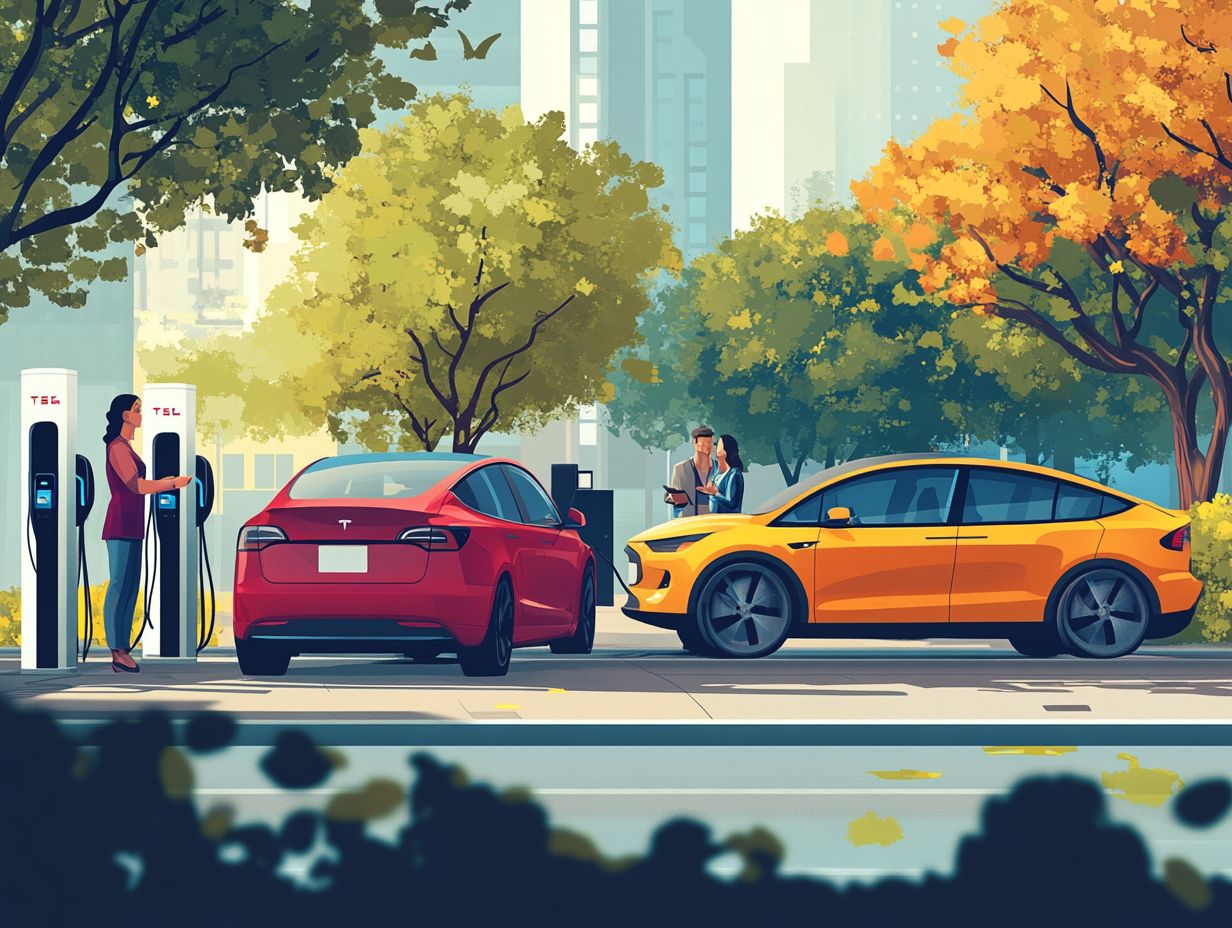
The cost savings of owning an electric vehicle (EV) can be quite impressive. EVs typically have lower fuel costs and minimal maintenance expenses compared to traditional gas cars.
For example, as an EV owner, you can expect to pay around 3 to 5 cents per mile for electricity, while gasoline generally costs about 10 to 15 cents per mile. That difference can add up significantly over time, especially if you have a regular commute.
Maintenance costs for EVs are generally lower due to their fewer moving parts. Many owners report spending considerably less on brakes and oil changes.
Consider a local taxi fleet that switched to EVs. They slashed their fuel costs by nearly 60% and experienced a 40% decrease in maintenance expenses. This shows that you can save big when you switch!
Factors to Consider for First-Time Buyers
As a first-time electric vehicle (EV) buyer, it’s essential to consider several critical factors. Explore your charging options, evaluate battery options, and assess overall EV performance to ensure a wise investment.
Each of these elements plays a significant role in your ownership experience, shaping your daily convenience and your long-term satisfaction with the vehicle.
Range and Battery Life
Range and battery life are vital when you’re in the market for an electric vehicle (EV). They shape your charging habits and overall driving experience.
These factors determine how far you can travel between recharges and how confident you feel using an EV for your daily commutes and longer road trips. A strong range can ease range anxiety, providing peace of mind during trips and encouraging a more sustainable lifestyle.
The longevity of battery life directly impacts energy consumption and efficiency, influencing both your environmental footprint and your wallet. The development of charging infrastructure is crucial; having readily available charging stations boosts consumer confidence, making the transition to electric vehicles more appealing.
Charging Options
The variety of charging options available for electric vehicles (EVs) is crucial for a seamless ownership experience. Public charging stations play an essential role in your decision to adopt this innovative technology.
At home, you might choose a Level 2 charging station, which offers a faster and more efficient way to recharge overnight, ensuring your vehicle is ready for the day ahead. Workplace charging solutions are also becoming more common, allowing you to conveniently top up your battery while you work.
A robust public charging infrastructure with fast chargers strategically located is vital. This network greatly influences your choices, as potential EV owners often weigh the convenience of charging against range anxiety. This ultimately shapes your willingness to make the switch to electric vehicles.
Cost and Financing
Understanding the costs and financing options for electric vehicles (EVs) is crucial for you as a prospective buyer. Attractive incentives like the federal EV credit can help.
This credit, along with potential state rebates, can substantially lower the initial purchase price, making EVs more accessible than you might think. Different models come with varying pricing strategies, including upfront discounts or bundled services, allowing you to choose what suits your needs best.
Financial institutions are stepping up, offering tailored financing solutions specifically designed for EV purchases, making buying even more appealing. Remember, although EVs may have higher upfront costs, they typically have lower maintenance and fuel expenditures compared to traditional vehicles. This leads to more favorable price margins over time.
As the market continues to evolve, grasping these elements can enable you to make informed and confident choices. Explore your options now and see how much you could save!
Comparison of Popular EV Models
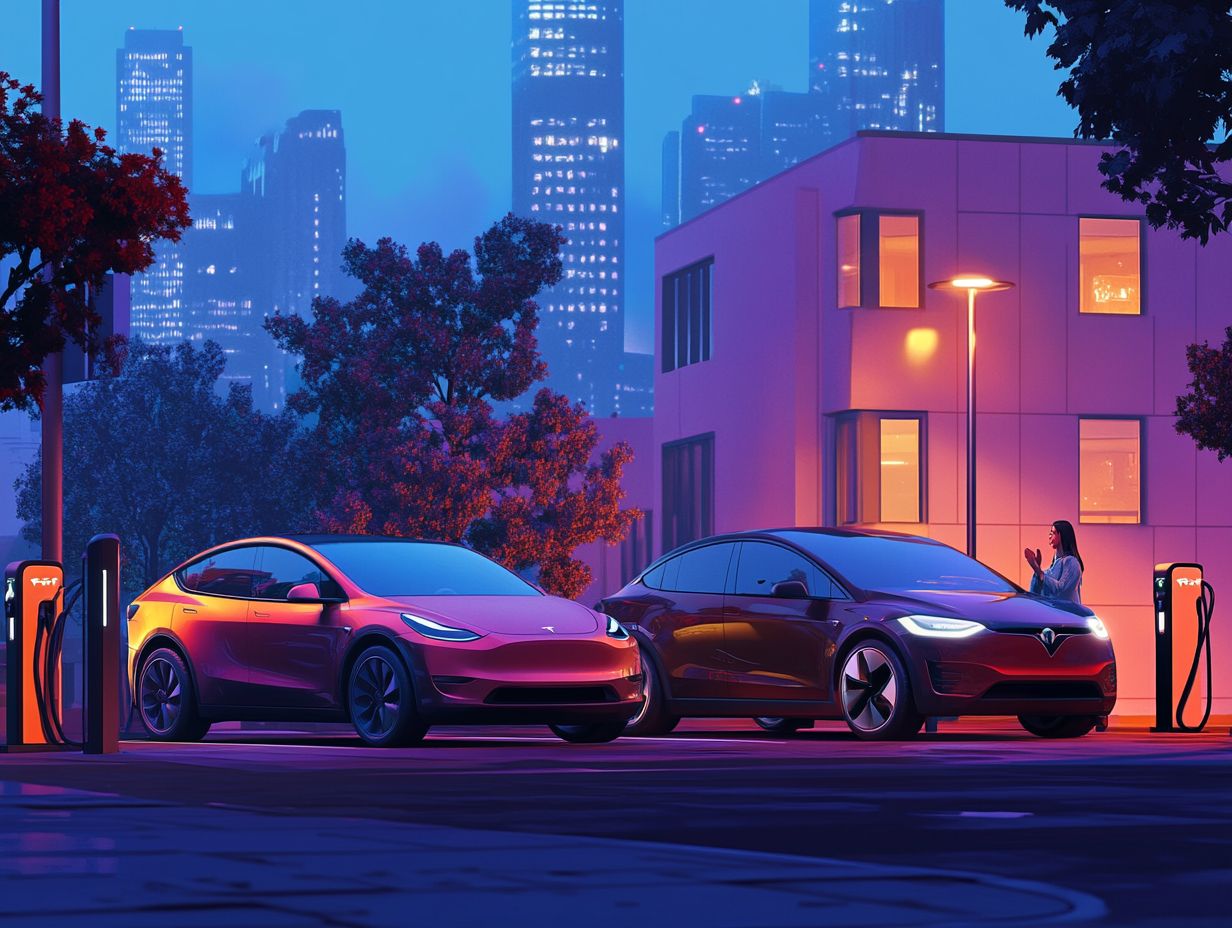
When you compare popular electric vehicle (EV) models, it’s crucial to assess the offerings from leading auto manufacturers such as Tesla, General Motors, Ford, Toyota, Chevrolet, and Nissan. Each brand showcases distinct features and price points that cater to various preferences and needs.
Features and Price Points
The features and price points of electric vehicles (EVs) vary significantly across brands. Tesla models are often at the forefront of battery technology and performance, shaping your choices as a consumer.
Ford and Chevrolet are quickly closing the gap by presenting a diverse lineup of models that boast safety features, impressive range capabilities, and competitive pricing. These elements are crucial in influencing buyers who might traditionally lean toward gas-powered vehicles, as they weigh maintenance costs, environmental benefits, and smart navigation.
When you compare the acceleration of EVs to conventional cars, you might find yourself pleasantly surprised. Many electric models outperform their gas counterparts, offering a compelling reason to consider the switch.
With the expansion of incentive programs and charging infrastructure, don’t miss out on the rising benefits of owning an EV. This shift is reshaping your preferences in today’s automotive landscape.
Tips for Making an Informed Decision
When you decide to purchase an electric vehicle (EV), it s essential to make an informed choice. This means engaging in thorough research and grasping the shifting consumer preferences within the ever-evolving auto industry landscape.
Research and Test Driving
Conducting thorough research and taking the time to test drive are essential steps for you as a potential electric vehicle (EV) buyer. This process helps you explore your options while staying in tune with consumer behavior trends.
By diving into various models, you can uncover key specifications and features that align perfectly with your lifestyle. After all, everyone has unique needs whether it’s daily commuting or family road trips and understanding these preferences is crucial for making an informed decision.
Test driving your top picks provides an invaluable opportunity to experience the vehicle firsthand. This allows you to assess not only the comfort and performance but also how intuitive the technology feels in your hands.
With a plethora of options available, taking a thoughtful approach to research, paired with introspection about your individual requirements, can lead to a more gratifying ownership experience.
Understanding Incentives and Tax Credits
Understanding the various incentives and tax credits available for electric vehicle (EV) buyers, including the federal EV credit, can significantly impact your purchasing decisions.
These financial benefits can greatly reduce the initial purchase price, making EVs more accessible to you and a broader audience. For example, many states offer additional rebates that can vary from a few hundred to several thousand dollars, while utility companies may provide special rates or incentives specifically for EV owners.
Tax credits can also help offset the costs associated with home charging stations, which are devices that allow you to charge your electric vehicle at home. As you become more aware of these advantages, you may find your preferences shifting toward EVs, contributing to a growing demand in the market.
For a deeper dive into the available incentives, explore resources like the U.S. Department of Energy’s website and the Electric Drive Transportation Association today to unlock your savings!
Frequently Asked Questions
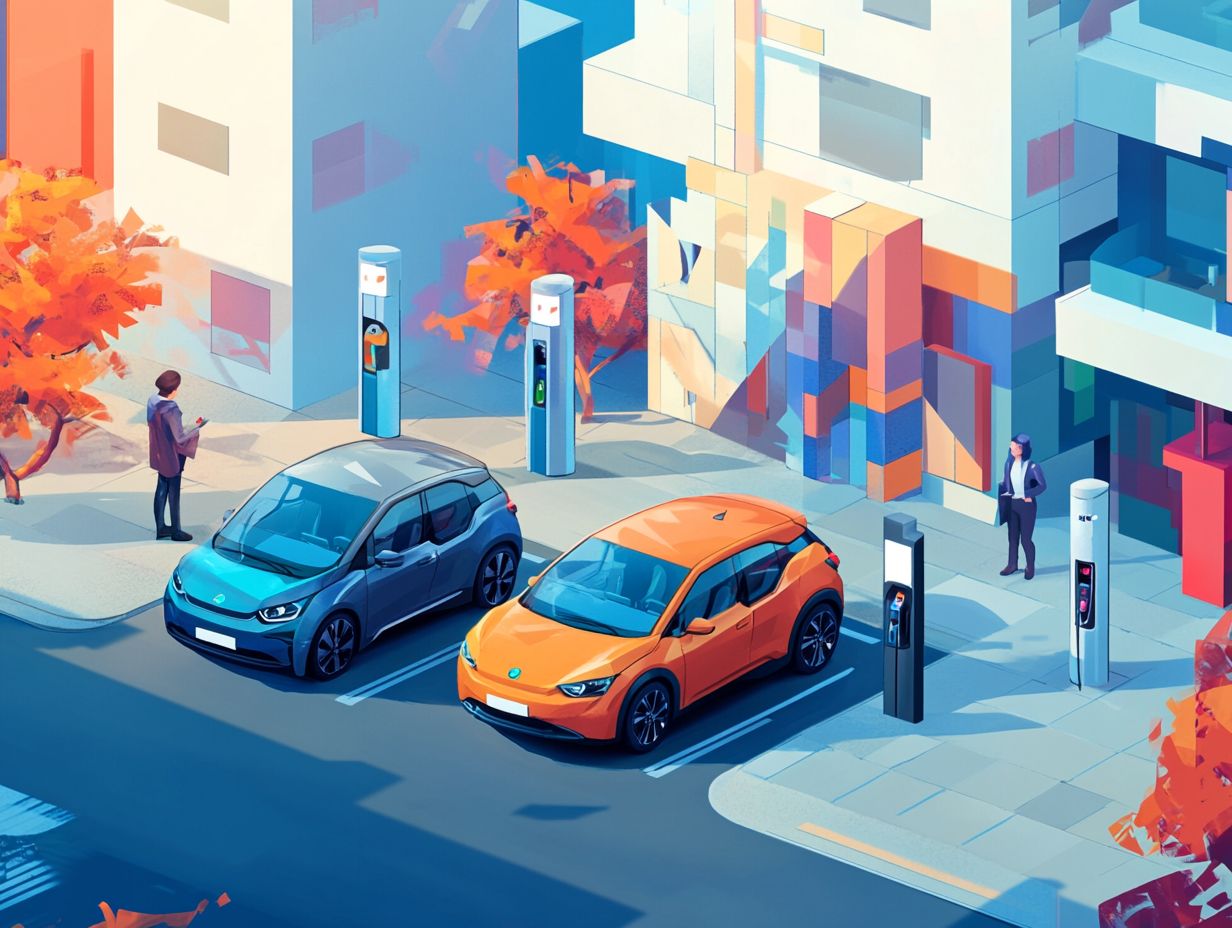
Curious about how to choose your first EV? Let’s break down the analysis!
A comparative analysis of EVs for first-time buyers is a study that compares different electric vehicles (EVs) available in the market. This analysis focuses on their features, prices, and overall value, including comparing EV battery options for those who are considering purchasing their first EV.
Making an informed decision is vital in this growing market. Take the time to research, test drive, and understand the incentives that can enhance your EV ownership experience.
What are the main factors to consider when conducting a comparative analysis of EVs for first-time buyers?
The main factors to consider in a comparative analysis of EVs for first-time buyers include:
- Cost of the vehicle
- Range
- Charging options
- Available features
- Financial benefits for buying an EV
How do EVs compare to traditional gasoline cars in terms of cost for first-time buyers?
Generally, EVs have a higher upfront cost than traditional gasoline cars. However, they offer lower operating costs, as they don’t require gasoline and have fewer mechanical components that need maintenance. For those looking to save money in the long run, it’s beneficial to learn how to compare EV models effectively.
What are the benefits of choosing an EV over a traditional gasoline car for first-time buyers?
Choosing an EV provides several benefits:
- Lower operating costs
- Reduced emissions
- Potential financial benefits
- Smoother and quieter driving experience
Don t miss out on these benefits!
What are the top recommended EVs for first-time buyers based on the comparative analysis?
Top recommended EVs for first-time buyers vary based on individual needs and preferences. For those looking for environmentally friendly choices, check out the best EVs for eco-conscious buyers. Popular options include:
- Tesla Model 3
- Nissan Leaf
- Chevrolet Bolt EV
- Hyundai Kona Electric
How can first-time buyers determine which EV is the best fit for their needs?
First-time buyers can find the best EV for their needs by considering:
- Budget
- Daily driving habits
- Access to charging infrastructure
- Desired features
- Available incentives
Test driving multiple EVs can also help in making an informed decision.
Summary
In conclusion, when analyzing EVs, first-time buyers should focus on costs, benefits, and personal preferences. To make an informed decision, refer to how to choose between EV models, explore various models, enjoy the advantages of EVs, and take action by visiting a dealership or researching further!



